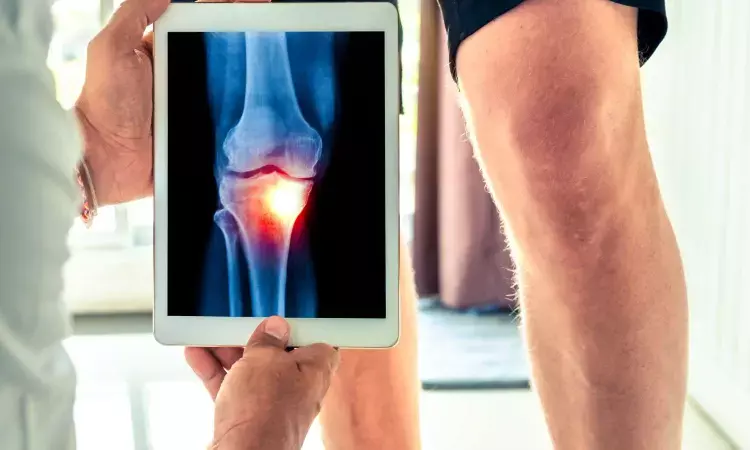- Home
- Medical news & Guidelines
- Anesthesiology
- Cardiology and CTVS
- Critical Care
- Dentistry
- Dermatology
- Diabetes and Endocrinology
- ENT
- Gastroenterology
- Medicine
- Nephrology
- Neurology
- Obstretics-Gynaecology
- Oncology
- Ophthalmology
- Orthopaedics
- Pediatrics-Neonatology
- Psychiatry
- Pulmonology
- Radiology
- Surgery
- Urology
- Laboratory Medicine
- Diet
- Nursing
- Paramedical
- Physiotherapy
- Health news
- Fact Check
- Bone Health Fact Check
- Brain Health Fact Check
- Cancer Related Fact Check
- Child Care Fact Check
- Dental and oral health fact check
- Diabetes and metabolic health fact check
- Diet and Nutrition Fact Check
- Eye and ENT Care Fact Check
- Fitness fact check
- Gut health fact check
- Heart health fact check
- Kidney health fact check
- Medical education fact check
- Men's health fact check
- Respiratory fact check
- Skin and hair care fact check
- Vaccine and Immunization fact check
- Women's health fact check
- AYUSH
- State News
- Andaman and Nicobar Islands
- Andhra Pradesh
- Arunachal Pradesh
- Assam
- Bihar
- Chandigarh
- Chattisgarh
- Dadra and Nagar Haveli
- Daman and Diu
- Delhi
- Goa
- Gujarat
- Haryana
- Himachal Pradesh
- Jammu & Kashmir
- Jharkhand
- Karnataka
- Kerala
- Ladakh
- Lakshadweep
- Madhya Pradesh
- Maharashtra
- Manipur
- Meghalaya
- Mizoram
- Nagaland
- Odisha
- Puducherry
- Punjab
- Rajasthan
- Sikkim
- Tamil Nadu
- Telangana
- Tripura
- Uttar Pradesh
- Uttrakhand
- West Bengal
- Medical Education
- Industry
Genicular nerve block provides short-term pain relief in knee osteoarthritis: Study

Australia: A recent study published in Wiley's Arthritis & Rheumatology has shown that ultrasound-guided genicular nerve block (GNB) provides short-term pain relief in patients with knee osteoarthritis.
Results from the clinical trial found that patients with knee osteoarthritis experience short-term pain relief from genicular nerve blocks or locally injected anaesthetics that block nerves around the knee joint.
In the parallel-group, placebo-controlled randomized trial of GNB conducted for 12 weeks, 59 patients were randomized to receive a nerve block or a placebo injection. At baseline and weeks 2, 4, 8 and 12, participants recorded their pain on a scale of 0 to 10.
Patients who received a nerve block reported improvement in pain scores at 2, 4, 8 and 12 weeks, compared with baseline, but with diminishing effects over time. Scores for nerve block versus placebo at baseline, weeks 2, 4, 8 and 12 were: 6.2 versus 5.3, 2.7 versus 4.7, 3.2 versus 5.1, 3.9 versus 4.9, and 4.6 versus 5.1, respectively. Most patients who received the blocks felt they had improved or greatly improved from baseline during the follow up period.
"This study demonstrates that genicular nerve block is an effective short-term therapy for pain management in people with knee osteoarthritis," said corresponding author Ernst M. Shanahan, BMBS, MPH, MHPE, PhD, FAFOEM, FRACP, of Flinders University, in Australia. "We think it may be a useful treatment option for this group of people, in particular those waiting for, or wishing to defer surgery."
Reference:
Ernst M. Shanahan,Lucinda Robinson,Suellen Lyne,Richard Woodman,Fin Cai,Kokum Dissanayake,Kate Paddick,Giovanna Cheung,Frank Voyvodic First published: 11 November 2022 https://doi.org/10.1002/art.42384
Dr Kamal Kant Kohli-MBBS, DTCD- a chest specialist with more than 30 years of practice and a flair for writing clinical articles, Dr Kamal Kant Kohli joined Medical Dialogues as a Chief Editor of Medical News. Besides writing articles, as an editor, he proofreads and verifies all the medical content published on Medical Dialogues including those coming from journals, studies,medical conferences,guidelines etc. Email: drkohli@medicaldialogues.in. Contact no. 011-43720751


